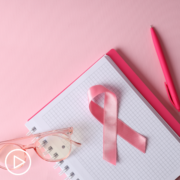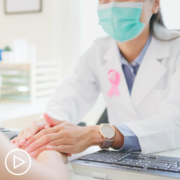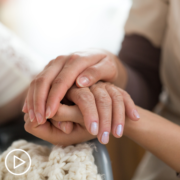How Are Common Breast Cancer Concerns Addressed?
How Are Common Breast Cancer Concerns Addressed? from Patient Empowerment Network on Vimeo.
How can common breast cancer concerns be addressed? Expert Dr. Bhuvaneswari Ramaswamy explains issues that can arise during a patient’s breast cancer journey and discusses how they can be managed.
Dr. Bhuvaneswari Ramaswamy is the Section Chief of Breast Medical Oncology and the Director of the Medical Oncology Fellowship Program in Breast Cancer at The Ohio State College of Medicine. Learn more about this expert here.
See More from Thrive Breast Cancer
Related Resources:

|

|

|
Transcript:
Katherine:
When discussing cancer treatments with a patient, they have worries, obviously. What are some common concerns that patients typically have, and how do you counsel them?
Dr. Ramaswamy:
I think the most common concern that they have is that their whole life has changed now. And that they’re going – this cancer is going to come back and when it comes back, they’re going to die. So, I mean, the death and the fear of recurrence is probably the most common concern. And I think the second common concern is the treatment-related toxicities that we talked about a little bit, particularly the hair loss or other things that’s going to change their lives forever after that. So, I think what is important to discuss to me, the most important thing to discuss is to clearly state to the patient there’s chances of cure. Meaning to say, your probability of being cured of this cancer, if you do this, this, and this is this high.
But there is, of course, a chance of 10 percent, 15 percent, 20 percent, 25 percent depending on the subtype of cancer they have and the staging and their age and all of that, of this coming back. If you, even if you do the treatments, but if you don’t do the treatments, the chances of coming back is this much higher, okay?
So, I think it’s important for them to know it is still very difficult because it doesn’t really reflect what is going to happen to them. It reflects what’s going to happen to 100 people with similar cancer. So, again, that is important to explain, but what you can explain to them is if you pull out 100 out of the 100 pellets in a box if you pull out 90 pellets, they’re all going to be cured. There’s only going to be 10 pellets that could have a recurrence. So, some ways to make them understand statistics. Not everybody comes with a good understanding of all of this. So, I think that’s important. And I think that also it’s important to talk about the treatments and how it effects – and how long it can affect them.
That they can get back and the goal of every provider is to really, the way I explain to them, you’re going to take a diversion in your life, but my goal is the diversion meets the main traffic at some point. That is the goal. And then you just go on smooth sailing. Of course, nobody knows the future, anything could happen, but we are here. And I think the other thing that’s important, yes, we could have metastatic disease, but you are not going to, I mean, I’m not saying nobody would, but most people with metastatic breast cancer live for several years.
And there are several treatments and new treatments coming like I said, every year. So, having that positive approach, even if it comes back is so important for them. So, I think those are the ways; educating, answering their question, providing emotional support, and if they need counseling, addressing that. I think those are very important.






